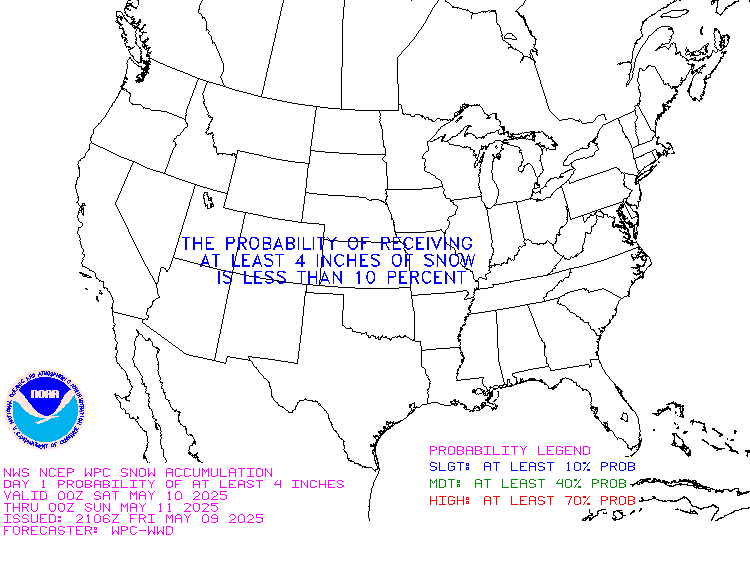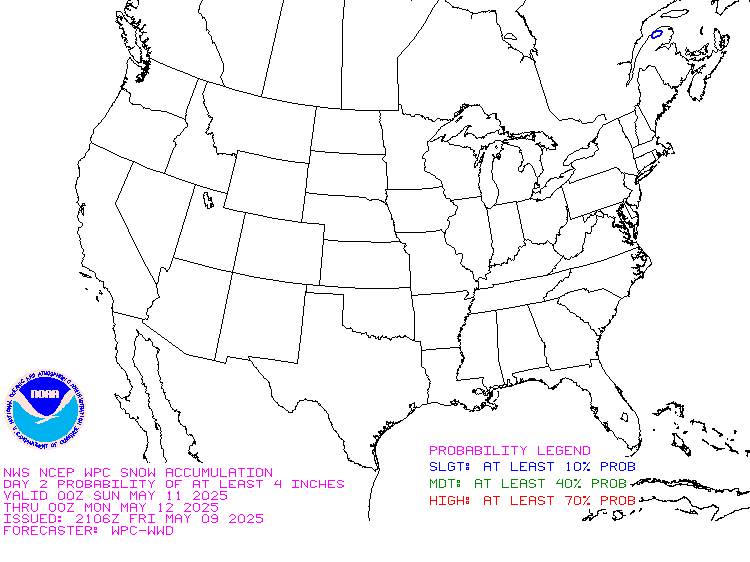This article focuses on what we are paying attention to in the next 48 to 72 hours. The article also includes weather maps for longer-term U.S. outlooks and a six-day World weather outlook which can be very useful for travelers.
First the highlights from the NWS.
Short Range Forecast Discussion
NWS Weather Prediction Center College Park MD
Fri Jan 26 2024
Valid 12Z Fri Jan 26 2024 – 12Z Sun Jan 28 2024..Heavy rain/freezing rain over parts of Northern New England; light
Rain/Freezing Rain over parts of the Pacific Northwest……Light snow for the Cascades and higher elevation snow across the
Central/Southern Rockies and Southwest; Moderate snow over Northern New
England……There is a Slight Risk of excessive rainfall over parts of the Pacific
Northwest Coast on Friday and the Central Gulf Coast into the
Central/Southern Appalachians and Mid-Atlantic on Friday and Saturday…
Looking out a bit farther and focusing on the more series events:
Looking at the world and of course, the U.S. shows here also. This evening we are looking at precipitation and the baseline here is such that it will tend to show warmer than baseline-normal precipitation due to the trend in temperatures.
Please click on “Read More” below to access the full report issued today.
| Notices: The article on the Seasonal Outlook can be accessed HERE. What would you like to learn about? Please provide that to me via the comment section at the end of the article. |
Now more detail on the 48-Hour Forecast (It is a 48 to 72 Hour Forecast actually)
Daily weather maps. The Day 1 map updates twice a day and the Day 2 and 3 maps update only once a day. These maps update automatically. But if that does not happen, you can get updates by clicking HERE
TODAY (or late in the day the evening/overnight map will appear) (Key to surface fronts shown on maps and you will then also be able to insert a city name or zip code and get a local NWS forecast).
TOMORROW
NEXT DAY
This animation shows how things may play out over the next 60 hours. To update click here.
The NWS Climate Prediction Center’s: Watches, Warnings, and Advisories plus other information can be found HERE. We post at least one of those updates daily, sometimes both. The Highlights are shown in the lede paragraph of this article.
ATMOSPHERIC RIVERS
This tells us what is approaching the West Coast. Click HERE to update If I have not gotten around to doing the update. Here is some useful information about Atmospheric Rivers.
Continuation of the NWS Short Range Forecast. It is updated by NWS twice a day and these updates can be found here
A front extending from the Lower Great Lakes/Mid-Atlantic to the Central
Gulf Coast on Friday will move off the Northeast Coast, while a wave of
low pressure develops over the Western Gulf Coast late Friday that will
move northeastward to the Mid-Atlantic by Sunday. Warm air and moisture
over the Mid-Atlantic will surge northward into the Northeast as
upper-level energy stream across the Northeast producing moderate snow
over Maine and heavy rain/freezing rain over parts of Upstate New York
into Vermont/New Hampshire on Friday. The snow and rain/freezing rain will
end by Saturday.Furthermore, moisture from the Gulf of Mexico will flow northward over the
Central Gulf Coast into Tennessee Valley/Southeast, producing showers and
thunderstorms with heavy rain. Therefore, the WPC has issued a Slight Risk
of excessive rainfall over parts of the Central Gulf Coast into Tennessee
Valley/Southeast through Saturday morning. The associated heavy rain will
create mainly localized areas of flash flooding, with urban areas, roads,
and small streams the most vulnerable.
On Saturday, as the wave of low pressure moves from the Lower Mississippi
Valley to the Mid-Atlantic, the area of excessive rainfall moves
northeastward to Central Appalachians/Mid-Atlantic. Therefore, the WPC has
issued a Slight Risk of excessive rainfall over parts of the
Central/Southern Appalachians and Mid-Atlantic from Saturday into Sunday
morning. The associated heavy rain will create mainly localized areas of
flash flooding, with urban areas, roads, and small streams the most
vulnerable. Moreover, light snow will fall over parts of the Lower Great
Lakes along the northern edge of the precipitation shield.Meanwhile, a weakening front moves over the Pacific Northwest on Friday. A
plume of moisture will stream into parts of the Northwest, producing heavy
rain along parts of the Oregon and Northern California Coast. Therefore,
the WPC has issued a Slight Risk of excessive rainfall over parts of the
Oregon and Northern California Coast. The associated heavy rain will
create mainly localized areas of flash flooding, with urban areas, roads,
small streams, and burn scars the most vulnerable.Also, on Friday, the moisture will produce rain and highest elevation snow
over parts of the Pacific Northwest into the Northern Intermountain
Region. There will be pockets of rain/freezing rain over parts of the
region, with a few pockets of rain/freezing rain extending into Saturday.
Moreover, upper-level energy moving across the Central/Southern Rockies
will produce light snow over the area on Friday.Further, the threat of excessive rainfall decreases slightly on Saturday.
Therefore, the WPC has issued a Marginal Risk of excessive rainfall over
parts of Northern California and the Pacific Northwest from Saturday
through Sunday morning.
Learn about wave patterns HERE.
Below is the current five-day cumulative forecast of precipitation (Updates can be found HERE)
Ski SnowReports
New Feature – Ski Reports. It is difficult to find reports that auto-update on-screen (and they are very long) but these links will get you to them – If you have additional suggestions make them in the comments section after every Econcurrents Article and we may add those links. We will try to not have too much overlap as that can add to the confusion.
Snow Forecasts. And remember this shows natural snow. Ski resorts also make their own snow.
Day 1

Day 2

Additional snow information can be found here, here, here, and here. The second link provides animations.
Now we look at Intermediate-Term “Outlook” maps for three time periods. Days 6 – 10, Days 8 – 14, and Weeks 3 and 4. An outlook differs from a forecast based on how NOAA uses these terms in that an “outlook” presents information as deviation from normal and the likelihood of these deviations.
Below are the links to obtain updates and additional information. They are particularly useful if you happen to be reading this article significantly later than when it was published. I always try to provide readers with the source of the information in my articles.
| Days 6 – 10 (shown in Row 1) | Days 8 – 14 (Shown in Row 2) | Weeks 3 and 4 (Shown in Row 3 but updates only on Fridays) |
| https://www.cpc.ncep.noaa. gov/products/predictions/610day/ | https://www.cpc.ncep .noaa.gov/products/predictions/814day/ | https://www.cpc.ncep.noaa.gov/products/predictions/WK34/ |
Showing the actual maps. They should now update automatically. The Week 3 – 4 Outlook only updates on Fridays. So below is what I call the Intermediate-term outlook. On Fridays, it extends out 28 Days. That declines day by day so on Thursday it only looks out 22 days until the next day when the Week 3 – 4 Outlook is updated and this extends the outlook by one additional week.
| 6–
10
|
|
|
| 8–
14 |
|
|
| 3–
4 |
|
|
HAZARDS OUTLOOKS
Click here for the latest complete Day 3 -7 Hazards forecast which updates only on weekdays. Once a week probably Monday or Tuesday I will update the images. I provided the link for readers to get daily updates on weekdays. Use your own judgment to decide if you need to update these images. I update almost all the images Friday Night for the weekend edition of this Weather Report. So normally readers do not need to update these images but if the weather is changing quickly you may want to.
Temperature month to date can be found at https://hprcc.unl.edu/products/maps/acis/MonthTDeptUS.png
Precipitation month to date can be found at https://hprcc.unl.edu/products/maps/acis /MonthPNormUS.png
World Forecast [that website is has been intermittant so be patient]
Below are the Day 1 -3 and 4-6 forecasts for temperature and precipitation. Updates and much additional information can be obtained HERE
World Temperature Anomalies
World Accumulated Precipitation
This information is provided by the University of Maine. They draw upon many different sources. There is a lot of information available at the link provided. I have just provided two useful forecasts. There are probably over a hundred different forecasts available from this source.
Worldwide Tropical Forecast (This is a NOAA Product)
This graphic updates on Tuesdays) If it has not been updated, you can get the update by clicking here Readers will only have to do that if they are reading this article much later than the date of it being published.
Information on Tropical Storms can be found HERE. Western Pacific information can be found HERE.
–
| I hope you found this article interesting and useful. |
–
